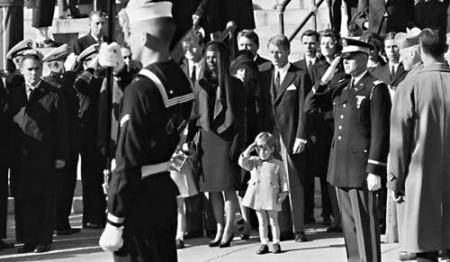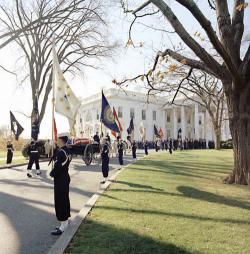November 21, 2013
 A son's salute: John F. Kennedy Jr. saluting his father’s casket on Nov. 25, 1963. Photo by Stan Steams/Corbis
A son's salute: John F. Kennedy Jr. saluting his father’s casket on Nov. 25, 1963. Photo by Stan Steams/Corbis
It was 50 years ago tomorrow – November 22, 1963 – that the life of the nation’s – and Boston’s – young political leader, Jack Kennedy, came to a stunning end. Our country’s president, shot and killed, dead in an instant from an assassin’s bullet.
It was unbelievable … shocking … stunning … dreadful … horrific … ghastly – you choose the word. And for my then-young generation, that afternoon marked the beginning of the end of an era of hyped-up optimism and the opening chapter in the series of tragic events – the loss of another Kennedy, a King, and a Malcolm X – that would come to mark the tumultuous decade of the 1960s.
It was the era of the Good Pope John and the Beatles, of Flower Power and Newport folk festivals, of rockets into space and giant leaps onto the moon. And it was a time when the nation descended into a Southeast Asia sinkhole that would traumatize our generation for decades to come.
If you were alive that late November day 50 years ago, and old enough to read a newspaper or watch the news on television, you surely remember where you were when you first heard the reports from Texas. And there was the avuncular Walter Cronkite on screen, wiping a tear, and a young, stern-faced Dan Rather, reporting live outside a hospital emergency room in Dallas.
I was a first-year student at Boston College, walking along with dozens of others in a stairwell at Fulton Hall, the business school, on the way from a morning class to the comfortable confines of the campus radio station where I had a job. A high school classmate coming down the stairs was the first to say: “Did you hear the news? The president’s been shot.”
I remember his face, I remember his name, Scott Kamins (I don’t think I have seen him since), and when I recall that day, the utter shock and disbelief of that moment remains a vivid memory. “It must be a bogus report,” I thought. “It couldn’t be true.” This man, the president, was our guy, still young like ourselves, with a beautiful wife and two lovable children. He would lead our nation out of the drab, cloth-coat, black-and-white Eisenhower Republican years into the sunshine of the great promise of wonderful things to come – the New Frontier, an age promising to fulfill our best dreams in a new, technicolor world: our own great American Camelot.
In our Bostonian culture, JFK was the shining star who was shadowed in office by an uncouth vice president from Texas, a man whom our guy had elevated beyond his station, someone likely consumed by flat-out jealousy. In our conceit, LBJ was the No. 2 guy who wished he were No. 1, and in our grief we made the case that the president had been targeted by some vast right-wing conspiracy seeking to seize control of the country from educated Easterners like us. That the man who did the shooting was actually a failed Russian expatriate was bewildering. Two days later, he was shot on live television before tens of millions of people from around the world, a scene I watched moments later on video tape replay after returning from Sunday morning Mass.

As was the case then, the anniversary day itself falls on a Friday. That long ago day began a long weekend of grief that kept the country riveted. Television was the unifying common denominator, and it is the images of the widespread grief, broadcast, for most of us, on the small video screens of the day in black and white, that flood back to memory: the coffin removed from Air Force One back in Washington, as Mrs. Kennedy stood by; the slow procession to the Capitol as the late president’s remains were carried to the rotunda, where we heard for the first time the term “catafalque”; the steady hoof-beats of the rider-less horse that accompanied the horse-drawn caisson that carried John Fitzgerald Kennedy’s mortal remains along the barren roads to Arlington Cemetery; and the slow, steady mournful beating of the muffled drums – Dum, dum, dum, dum, dum, dum dum; Dum dum, dum, dum, dum, dum dum, over and over and over – that brought him to his grave.
It was a day for the ages, a time to beat the drum, slowly.


